 Petzlover
Petzlover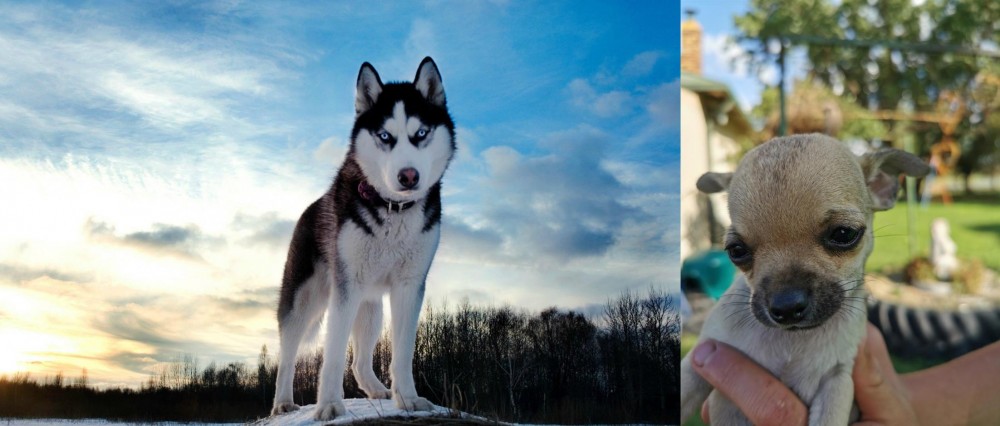 Alaskan Husky is originated from United States but Chihuahua is originated from Mexico. Alaskan Husky may grow 33 cm / 13 inches higher than Chihuahua. Alaskan Husky may weigh 21 kg / 47 pounds more than Chihuahua. Alaskan Husky may live 5 years less than Chihuahua. Alaskan Husky may have more litter size than Chihuahua. Both Alaskan Husky and Chihuahua requires Low Maintenance.
Alaskan Husky is originated from United States but Chihuahua is originated from Mexico. Alaskan Husky may grow 33 cm / 13 inches higher than Chihuahua. Alaskan Husky may weigh 21 kg / 47 pounds more than Chihuahua. Alaskan Husky may live 5 years less than Chihuahua. Alaskan Husky may have more litter size than Chihuahua. Both Alaskan Husky and Chihuahua requires Low Maintenance.
 Alaskan Husky is created to be a working dog who can do many different jobs like hauling logs, transport, supplies delivery, racing dogs, etc. Mushers created this breed. Alaskan Husky is created as a mix of Inuit dog, Siberian Husky, Greyhound and German pointers, and it is very difficult to find pure breed Alaskan Husky, and they are not recognized by any Kennel club.
Alaskan Husky is created to be a working dog who can do many different jobs like hauling logs, transport, supplies delivery, racing dogs, etc. Mushers created this breed. Alaskan Husky is created as a mix of Inuit dog, Siberian Husky, Greyhound and German pointers, and it is very difficult to find pure breed Alaskan Husky, and they are not recognized by any Kennel club.
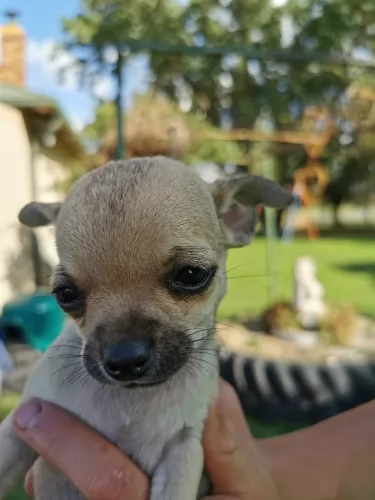 Quite a bit of the Chihuahua’s history is shrouded in mystery, and there are different versions about its origins.
Quite a bit of the Chihuahua’s history is shrouded in mystery, and there are different versions about its origins.
While historians speculate, most will agree that the tiny dog hails from Mexico. The UK Kennel Club considers the smooth- and long coat Chihuahuas as 2 distinct breeds.It was in 1904 that the Chihuahua became a registered breed by the American Kennel Club.
Chihuahua is actually the name of a state in Mexico, and it is amazing that Chihuahua specimens were found way back in the 1800's already. Today the Chihuahua is a very popular dog breed in several countries.
 Alaskan Husky average weight depends from dog to dog, but on average male weights 21-25kg, while their height is moderate size. Females are slightly smaller than males, and they can weight 17-19kg.
Alaskan Husky average weight depends from dog to dog, but on average male weights 21-25kg, while their height is moderate size. Females are slightly smaller than males, and they can weight 17-19kg.
A lifespan of Alaskan Husky depends, again, from dog to dog, but it is 10-15 years. Of course, if you are taking care of your dog, they can live much longer.
Litter Size of average female is 4-10 puppies.
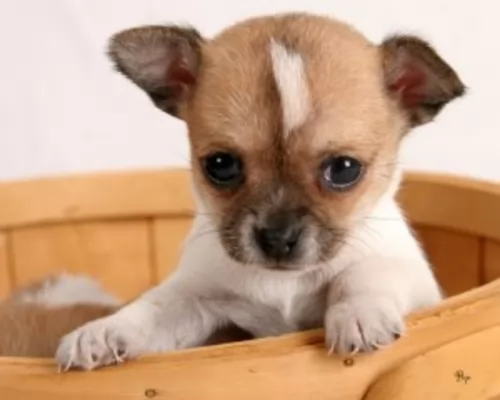 The small Chihuahua stands at about 15 – 23 cm and he weighs about 1,5 – 4kg.
The small Chihuahua stands at about 15 – 23 cm and he weighs about 1,5 – 4kg.
You’ll notice that he shivers when he is excited or when he is cold or frightened. Some people buy him a jersey to don on cooler days. With this tiny toy dog, you get a short- and a long coated Chihuahua.
This is the smallest dog breed and his coat is available in a number of colors such as fawn, tan, white and black. It is the dog’s round apple-shaped head which is a distinctive feature. He has erect ears and huge fruit-bat type eyes.
The Chihuahua is such an alert, fun-loving, feisty little dog, and though he may appear to be an ideal pet for children, he actually isn’t. He is too dainty and frail, and a child, during play, could accidentally crush him.
It’s a pity though because he just loves being around his human family. He is also a highly strung dog, and given the chance, he’ll nip and even bite during games. It is why socialization and training are considered important for the Chihuahua.
Just like with children, how you raise and treat your Chihuahua will determine how he turns out. He is such a sweet little dog that training and socialization can remove these unwanted characteristics. He is very intelligent and responds well to training.
 Alaskan Husky is the best dog for the active people or families. They are bred to be working dogs. This breed is not created for it looks or pedigree, but this breed is bred purely to help with various tasks. They love being around the family, and they are very happy and cheerful. Alaskan Husky is not good watchdogs because they love everyone, including strangers. They are highly intelligent breed, but it can be tricky to train them sometimes. You must be a leader who makes decisions because if you are not confident, they will not see the reason for listening to you. The best way of training your dog would be with patience and firm, decisive manner. The old-fashioned way of training that includes punishment is not recommendable. They do not respond well to that. Training with awards is the best way to teach your dog. Alaskan Husky is a very active dog, so they are not very good for apartments. Although, you can have them in apartments but only if they have active walks and exercises. They love jogging, and they can be excellent buddies in any activity. They will love all the animals but it is important for them to socialize from the early age.
Alaskan Husky is the best dog for the active people or families. They are bred to be working dogs. This breed is not created for it looks or pedigree, but this breed is bred purely to help with various tasks. They love being around the family, and they are very happy and cheerful. Alaskan Husky is not good watchdogs because they love everyone, including strangers. They are highly intelligent breed, but it can be tricky to train them sometimes. You must be a leader who makes decisions because if you are not confident, they will not see the reason for listening to you. The best way of training your dog would be with patience and firm, decisive manner. The old-fashioned way of training that includes punishment is not recommendable. They do not respond well to that. Training with awards is the best way to teach your dog. Alaskan Husky is a very active dog, so they are not very good for apartments. Although, you can have them in apartments but only if they have active walks and exercises. They love jogging, and they can be excellent buddies in any activity. They will love all the animals but it is important for them to socialize from the early age.
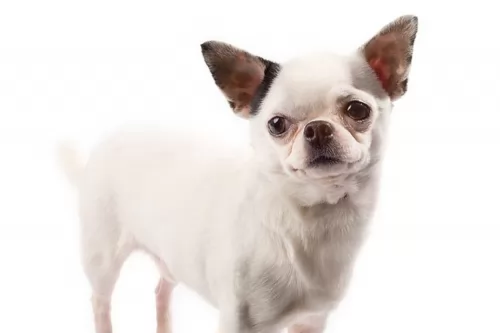 Small and feisty, the Chihuahua’s personality isn’t set in stone, and the tiny dog can be either shy and timid or he can be social, confident and jaunty.
Small and feisty, the Chihuahua’s personality isn’t set in stone, and the tiny dog can be either shy and timid or he can be social, confident and jaunty.
They're always loyal and affectionate to their human owners, but they don’t get on too well with- and are wary of small children who aren’t disciplined and who could hurt them.
With his big eyes and big ears together with his comical antics, they can be a source of entertainment for their human owners. He is easy to train too and even though he is small, he doesn’t think he is, and he is willing to use his big personality to make you a loving, loyal and devoted companion.
 This breed has no any specific health issues. However, as any breed they can develop some issues that are related to genetics. It is very important to discuss with owners that you are getting the dog from, and if they are not ready to show medical records or proofs that dogs are healthy then you should be extra careful. If you do not have a lot of experience in getting a puppy or an adult dog, you should bring someone who has more experience. Again, this breed is very healthy and if you give them adequate caring with regular vet checks you will have a healthy and a happy dog for a long time.
This breed has no any specific health issues. However, as any breed they can develop some issues that are related to genetics. It is very important to discuss with owners that you are getting the dog from, and if they are not ready to show medical records or proofs that dogs are healthy then you should be extra careful. If you do not have a lot of experience in getting a puppy or an adult dog, you should bring someone who has more experience. Again, this breed is very healthy and if you give them adequate caring with regular vet checks you will have a healthy and a happy dog for a long time.
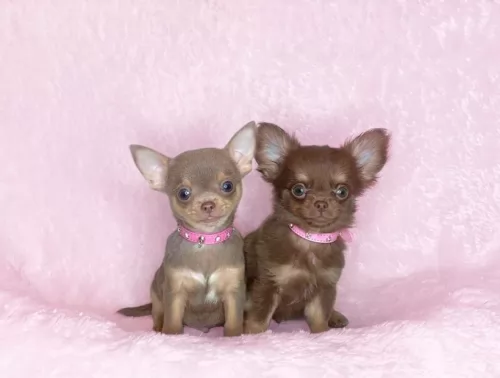 The Chihuahua doesn't have any particular health issues, more so when you get him from a reputable breeder. With good care he can reach 20 years of age.
The Chihuahua doesn't have any particular health issues, more so when you get him from a reputable breeder. With good care he can reach 20 years of age.
Known as low blood sugar, hypoglycemia is easily treatable, but if it isn’t caught early it can be fatal.Hypoglycemia makes a dog lethargic and he’ll shiver and could go into a coma. Get him to the vet immediately.
Gastric Dilatation or bloat is when the stomach twists, it becomes enlarged and blood supply is cut off to the stomach. Left untreated, it can be fatal.
Chihuahuas are susceptible to dental problems, so you will need to brush his teeth 2 or 3 times a week to prevent tartar build-up, gum disease, loss of teeth and other diseases.
 Feeding Alaskan Husky, or basically any other dog depends on how active your dog is, and how big it is. Basically, if it is big and very active you will have to give it more food. On average, Alaskan Husky can eat 3-4 cups of high-quality dry food and that should be enough to keep them well-fed and healthy. You can always add vegetables, oil or fruits in their meal, but first, consult which additional food is the best for your dog. Carrots, broccoli, apples are always a good treat for any pet.
Feeding Alaskan Husky, or basically any other dog depends on how active your dog is, and how big it is. Basically, if it is big and very active you will have to give it more food. On average, Alaskan Husky can eat 3-4 cups of high-quality dry food and that should be enough to keep them well-fed and healthy. You can always add vegetables, oil or fruits in their meal, but first, consult which additional food is the best for your dog. Carrots, broccoli, apples are always a good treat for any pet.
Puppies eat more than an adult dog, so it would be perfect if you can divide small portions of food 3-5 times per day. It will help them develop into perfectly healthy adult dogs.
They are not very difficult to groom. Overall, Alaskan Husky does not need any special care, except twice a year during shed season. Then you have to brush them with a metal comb every day, but overall, occasional brushing and bathing when it is necessary is more than enough to have a healthy and perfectly groomed pet.
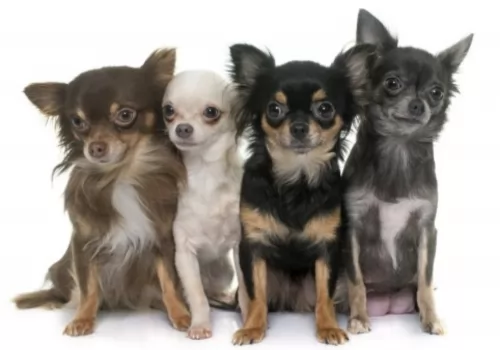 Always make sure to choose a high-quality dog food for your Chihuahua as this will keep him in tip-top health. A healthy Chihuahua can live to be 20 years of age. Speak to a veterinarian for recommendations on the best type of food to feed your tiny pet.
Always make sure to choose a high-quality dog food for your Chihuahua as this will keep him in tip-top health. A healthy Chihuahua can live to be 20 years of age. Speak to a veterinarian for recommendations on the best type of food to feed your tiny pet.
Giving him some home-made food such as brown rice, vegetables and cooked chicken for instance will be a welcome treat for him. Make sure he always has a bowl of fresh, cool water close by.
The Chihuahua may well be the smallest toy sized dog breed, but don’t be mistaken – he has plenty of energy and is constantly prancing around. He is more than capable of living in a small apartment, but even so he needs to be taken outside every now and then for a game or a walk.
Be careful with your small pet though, as too much exercise can lead to elbow- and hip dysplasia.
The Chihuahua is a moderate shedder with Spring being their heavier shedding period. Because of his small size, you won’t be bothered by too much hair. The short haired Chihuahua is easy to maintain and with a rubber brush, you can brush him gently twice a week.
You’ll also need to clip his nails and if you can’t manage this your vet can also help you.